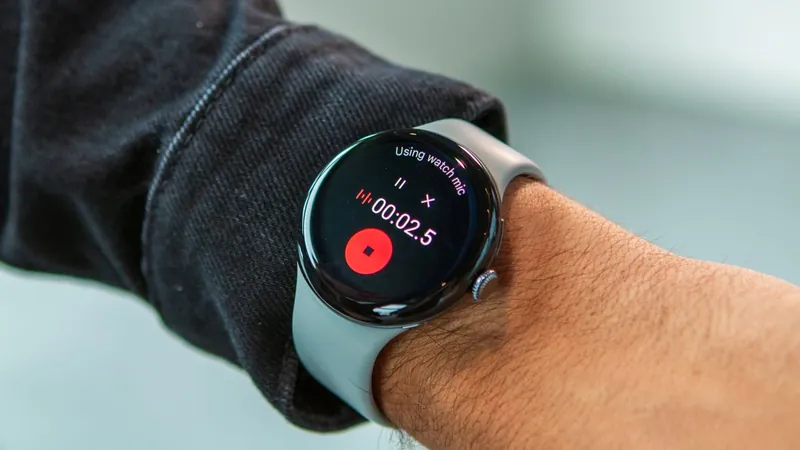
Revolutionary Technology from U of G Promises Custom-Fit Face Masks for Ultimate Comfort and Protection!
2024-12-10
Author: Liam
Revolutionary Technology from U of G Promises Custom-Fit Face Masks for Ultimate Comfort and Protection!
In a groundbreaking advancement emerging from the University of Guelph, engineering researchers have unveiled a cost-effective method for producing customized face masks that not only enhance comfort but also offer superior protection against airborne particles. This innovative approach is particularly significant in the ongoing fight against airborne diseases and health hazards.
Since the onset of the COVID-19 pandemic, face masks have become a crucial element of our daily lives. However, many commercially available masks are designed as one-size-fits-all solutions, leading to frustrating gaps that can compromise both comfort and efficacy. Dr. Sheng Yang, a professor in the College of Engineering and Physical Sciences, and his team recognized the necessity for personalized face masks with a precise fit.
"We aimed to create technology that streamlines the rapid production of custom-fit masks or respirators through advanced automation," Yang stated. Initial research unveiled that while customized face masks were available, they often came with a hefty price tag and lengthy wait times.
How It Works: Cutting-Edge Algorithms Enhance Mask Design
The team’s innovative video-based approach allows individuals to record a brief five-second video of their face. This recording captures essential facial features from multiple angles and expressions. By cropping the footage into still images, the researchers focus on critical points of interest, such as the contours of the face and the measurements between facial features. This detailed information is then fed into sophisticated design software, where advanced algorithms create a mask model that is uniquely tailored to the individual's facial structure.
The automation of this process removes the need for a traditional designer, thereby saving both time and costs. "Our method is much more economical compared to conventional manufacturing methods like casting," Yang explained. "By utilizing automation and 3D printing, we can achieve a custom fit without the high expenses."
Participants who tested the 3D-printed masks praised their comfortable fit, noting that they could easily move their jaws and make facial expressions without feeling constrained.
Challenges Ahead: Overcoming Material Limitations
Despite the promising results, Yang pointed out some challenges, particularly the limited availability of 3D printable medical-grade materials. The effectiveness of a mask relies heavily on its composition and the quality of the filters used. While the mask serves as a supportive structure against the face, the actual filtration occurs via an external filter mounted on top. The production of such filters remains commercialized and requires expertise beyond the design phase.
Expanding Beyond Just Masks: A Glimpse into the Future
The implications of this technology extend well beyond personal protective equipment. "We believe the knowledge we've developed here can be adapted for numerous future applications," Yang mentioned. He has already attracted interest from medical practitioners, specifically those treating patients with sleep apnea, eager to explore how this technology could benefit customized respirators, particularly continuous positive airway pressure (CPAP) machines.
Moreover, Yang envisions using this cutting-edge technology for various customized products that cater to the unique features of the human body. Potential applications include tailored sportswear, custom-fitted helmets, gloves, goggles, shoes, and even dental implants.
"We are confident that this technological breakthrough can make significant contributions to public health and safety," Yang concluded.
This innovative study has been published in The International Journal of Advanced Manufacturing Technology and is supported by a discovery grant from the National Sciences and Engineering Research Council of Canada.
Stay tuned for more breakthroughs in personalized health solutions that could redefine the way we think about comfort and safety in our everyday lives!









 Brasil (PT)
Brasil (PT)
 Canada (EN)
Canada (EN)
 Chile (ES)
Chile (ES)
 España (ES)
España (ES)
 France (FR)
France (FR)
 Hong Kong (EN)
Hong Kong (EN)
 Italia (IT)
Italia (IT)
 日本 (JA)
日本 (JA)
 Magyarország (HU)
Magyarország (HU)
 Norge (NO)
Norge (NO)
 Polska (PL)
Polska (PL)
 Schweiz (DE)
Schweiz (DE)
 Singapore (EN)
Singapore (EN)
 Sverige (SV)
Sverige (SV)
 Suomi (FI)
Suomi (FI)
 Türkiye (TR)
Türkiye (TR)